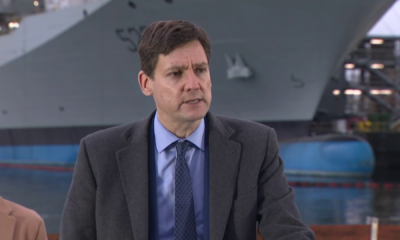Local News
B.C. businesses ‘operating in the fog’ with looming U.S. tariff threat

As the country braces for a shift in leadership following Prime Minister Justin Trudeau’s resignation, some B.C. businesses are grappling with increasing uncertainty ahead of U.S. President-elect Donald Trump’s inauguration and his threatened 25 per cent tariffs on all Canadian imports.
The growing concern is being fueled by the lack of clarity in Ottawa on how the government plans to handle talks with the Trump administration.
“Uncertainty is really the enemy of investment. And right now, Canadian businesses and B.C. businesses are operating in the fog,” said Jairo Yunis, Director of Policy at the BC Business Council.
Yunis says the proposed tariffs would deal a major blow to the province, as combined trade with the U.S. making up around 18 per cent of B.C.’s economy.
“In 2023, we exported around $30.4 billion worth of goods to the U.S. from B.C., energy, forestry products, metals accounted for six of every $10 we shipped to the U.S. This highlights how important natural resources are to the provinces economic strength and long term prosperity.”
Regardless of who steps in to replace Trudeau, Yunis stresses that businesses need to see a clear and consistent strategy to address competitiveness, trade challenges, and foster economic growth.
“Hopefully we can get governments on board with this growth agenda and addressing some of the structural challenges we have, like the low business investments, stagnated productivity and the declining GDP per capita. Those are things businesses are looking for.”
But while some business owners may be preparing for a possible economic fallout, others are choosing to take it one day at a time.
Mike Kirby, co-owner of Structural Ware Products, a steel fabrication company in Pitt Meadows says his business relies on exporting to the U.S. to generate approximately a quarter of its revenue.
“We discuss this daily, but until the ink is dry, we don’t get too bent out of shape,” Kirby told 1130 NewsRadio. “Tariffs have always been around, and they’ve moved over every industry in some capacity, and the steel industry especially.”
While acknowledging that his company could likely absorb a 25 per cent tariff, Kirby emphasized the complexities of the situation, noting that the tariff could ultimately backfire on the U.S. economy, particularly when it comes to steel.
“The U.S. doesn’t have enough domestic production capacity to meet its own demand, and imposing these tariffs could end up hurting not just Canadian businesses but also American consumers and industries. It’s a lose-lose.”
Reacting to the news of Trudeau’s departure Monday morning, Trump once again floated the idea of Canada becoming the 51st U.S. state as a way to avoid the tariffs, claiming many Canadian would embrace the change.
As it stands, Trump plans to impose the steep tariffs on Canada following his inauguration on Jan. 20.












